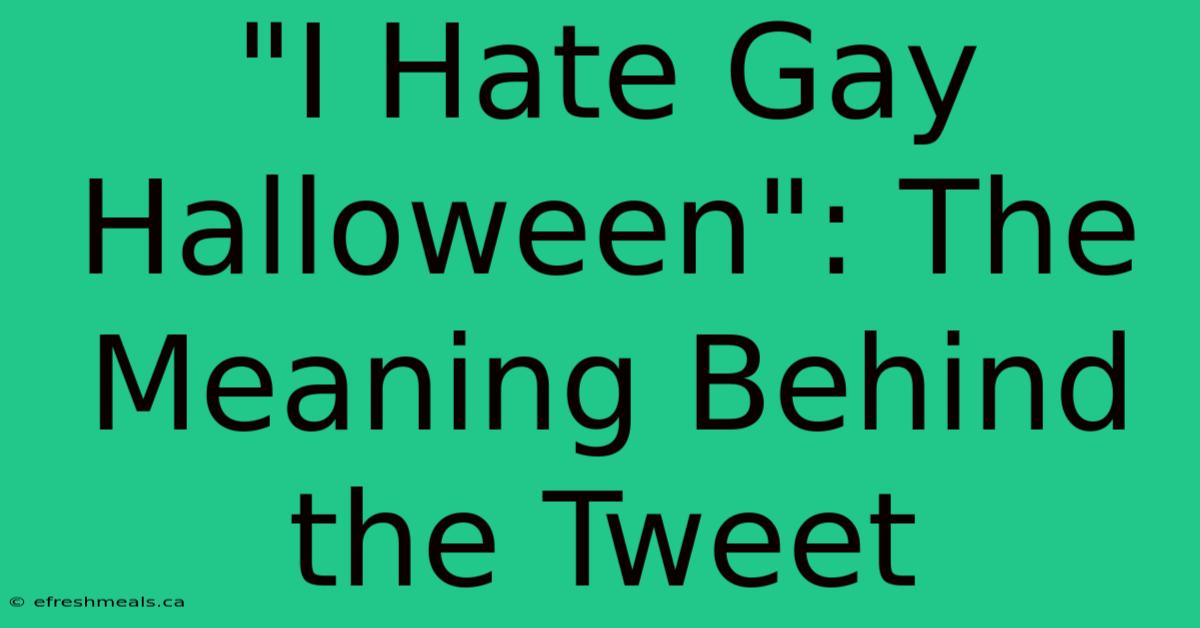"I Hate Gay Halloween": The Meaning Behind The Tweet

Discover more detailed and exciting information on our website. Click the link below to start your adventure: Visit Best Website nimila.me. Don't miss out!
Table of Contents
"I Hate Gay Halloween": The Meaning Behind the Tweet
Have you ever wondered what the phrase "I Hate Gay Halloween" truly means? This peculiar statement has sparked curiosity and confusion, prompting many to delve deeper into its origins and potential interpretations.
Why It Matters
Understanding the meaning behind "I Hate Gay Halloween" is crucial for several reasons. It sheds light on the complexities of online discourse, particularly the potential for misunderstandings and misinterpretations. Moreover, it highlights the need for greater awareness and sensitivity when engaging with social media, especially when dealing with sensitive topics.
Key Takeaways of "I Hate Gay Halloween"
| Key Takeaway | Description |
|---|---|
| Misinterpretation: | The phrase often arises from a misunderstanding of the word "gay" in its historical context. It can be confused with the modern meaning of "gay" referring to sexual orientation. |
| Origin: | The phrase originates from an old-fashioned usage of "gay" meaning "happy" or "joyful," referring to the festive nature of Halloween. |
| Intention: | While seemingly offensive, the original intention of the phrase is not discriminatory. It simply expresses a dislike for the Halloween festivities. |
Let's delve into the details of "I Hate Gay Halloween" and its deeper meanings.
"I Hate Gay Halloween": A Closer Look
The phrase "I Hate Gay Halloween" is a perplexing one, especially in today's world where the term "gay" is primarily associated with sexual orientation. However, it's important to understand that the phrase predates the modern usage of the word "gay."
The term "gay" in the phrase "I Hate Gay Halloween" originates from an older usage that meant "happy" or "joyful." Therefore, the statement was likely meant to express a dislike for the festivities of Halloween, not any form of prejudice against the LGBTQ+ community.
"Gay" in Historical Context
The word "gay" has evolved significantly over time. In the past, it was commonly used to describe a cheerful, carefree, or frivolous mood. This usage is evident in phrases like "gay abandon" or "gay spirits." This historical context is vital for understanding the true meaning behind the phrase "I Hate Gay Halloween."
Misinterpretation and Potential Harm
Despite its historical origin, the phrase "I Hate Gay Halloween" can be interpreted as offensive and discriminatory, particularly within the current understanding of the word "gay." It's important to acknowledge the potential for misinterpretation and the harm it can cause, regardless of the original intent.
Engaging with Online Discourse
The "I Hate Gay Halloween" example highlights the complexities of online discourse and the need for critical thinking. When encountering seemingly offensive or confusing statements, it's crucial to consider the context, historical usage, and potential for misinterpretation.
FAQ
1. When did the meaning of "gay" shift?
The meaning of "gay" began to shift in the early 20th century, gradually becoming associated with same-sex attraction. However, the older, "happy" meaning persisted for some time, particularly in older generations.
2. Is the phrase "I Hate Gay Halloween" always harmful?
While it can be perceived as harmful, the intention behind the phrase might not always be discriminatory. However, it is essential to be aware of the potential for misinterpretation and the harm it can cause.
3. How can I avoid misinterpretations online?
Always consider the context, historical usage, and potential for misunderstanding before reacting to online statements. Communicate with clarity and sensitivity, and be open to discussing different perspectives.
Tips for Navigating Online Discourse
- Think before you post: Consider the potential impact of your words, especially on sensitive topics.
- Engage with empathy: Try to understand different perspectives, even if you don't agree.
- Be respectful: Treat others with dignity and avoid inflammatory language.
- Be open to learning: Continuously educate yourself on social issues and historical context.
Summary of "I Hate Gay Halloween"
The phrase "I Hate Gay Halloween" is a fascinating example of how language evolves and can be misinterpreted. While the original intention might not have been discriminatory, the potential for harm remains due to the shift in the meaning of the word "gay." This example highlights the importance of context, sensitivity, and critical thinking in navigating online discourse.
Closing Message:
Understanding the nuances of language, history, and social context is crucial for effective and respectful communication. By engaging with online discourse thoughtfully and with empathy, we can foster a more understanding and inclusive online environment.

Thank you for visiting our website wich cover about "I Hate Gay Halloween": The Meaning Behind The Tweet. We hope the information provided has been useful to you. Feel free to contact us if you have any questions or need further assistance. See you next time and dont miss to bookmark.
Featured Posts
-
Severe Weather Threat Looms In Us
Nov 01, 2024
-
Diwali Understanding The Festival Of Lights
Nov 01, 2024
-
East Coast Gulf Coast Port Workers Union Resumes
Nov 01, 2024
-
Diwali 2024 Wishes Friends Family And More
Nov 01, 2024
-
Is Hugh Grant Really A Devil Heretic Review
Nov 01, 2024
